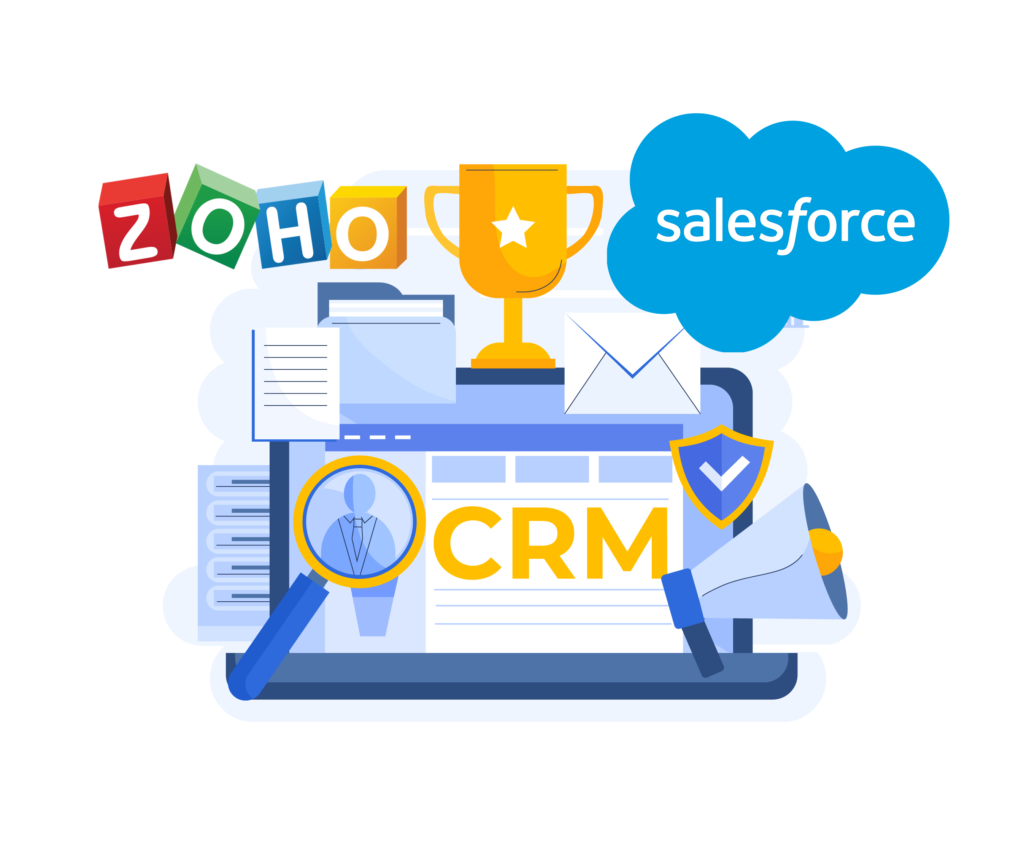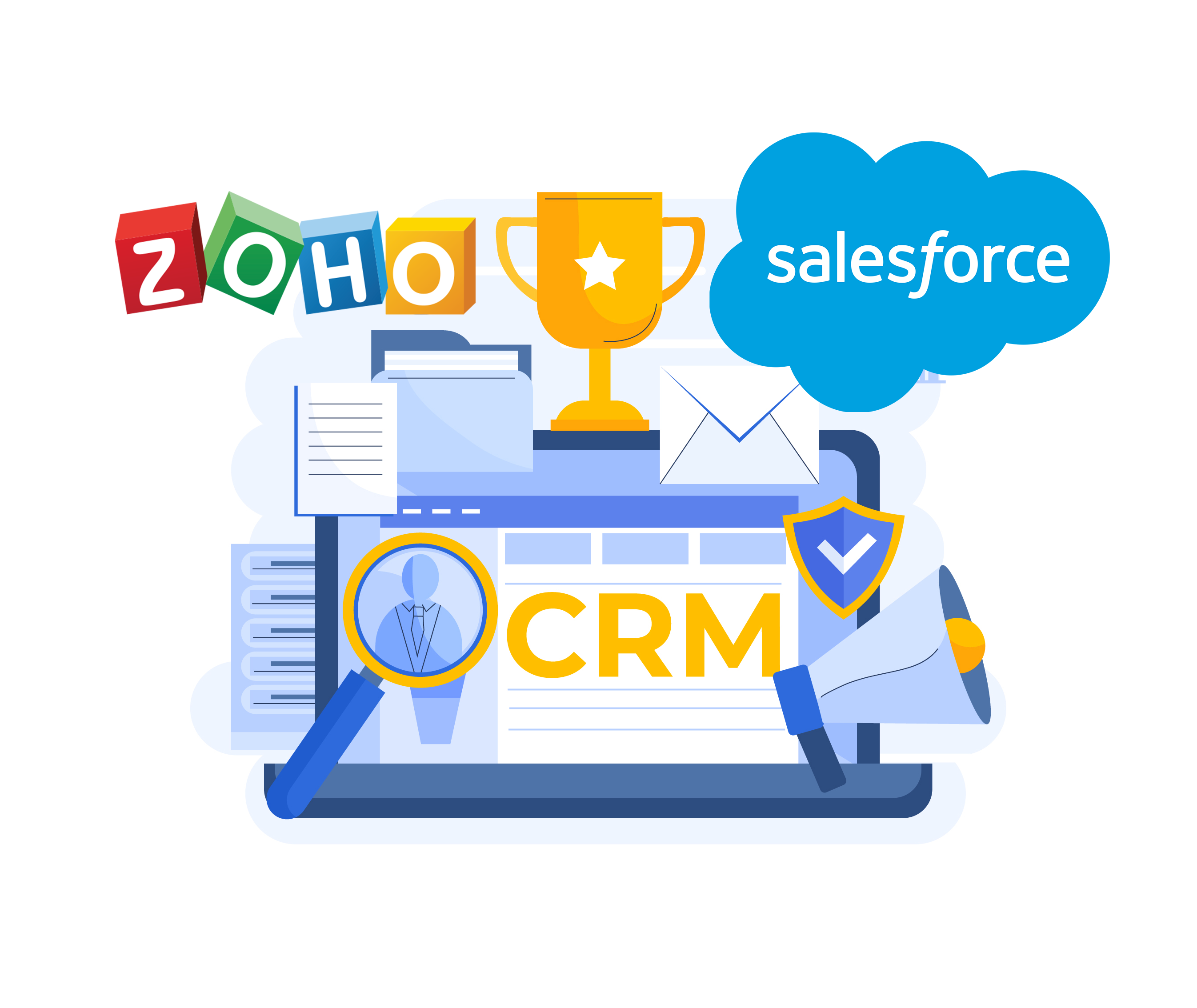Zoho CRM vs Salesforce: Which One to Choose?
When it comes to choosing a CRM solution for your business, Zoho CRM and Salesforce are two of the most popular options available. Both of these platforms offer a wide range of features and functionalities to help businesses streamline their sales and marketing processes. However, there are some key differences between Zoho CRM and Salesforce that you should be aware of before making a decision.

Pricing and Packages
Zoho CRM offers a range of pricing plans to suit businesses of all sizes. The pricing starts at $14 per user per month and goes up to $40 per user per month for their Enterprise plan. Zoho CRM also offers a free version for up to three users, which is ideal for small businesses.
Salesforce, on the other hand, is known for its premium pricing. The platform starts at $25 per user per month for their Essentials plan and goes up to $300 per user per month for their Unlimited plan. Salesforce also offers a free trial period, but it doesn’t have a free version like Zoho CRM.
User Interface
Zoho CRM has a simple and intuitive user interface that is easy to navigate. The platform has a modern design and is easy to use, even for beginners. Zoho CRM also offers customization options to allow users to customize the interface to their liking.
Salesforce, on the other hand, has a more complex user interface. The platform has a lot of features and functionalities, which can make it overwhelming for beginners. However, Salesforce also offers customization options, and once you get used to the platform, it can be quite efficient to use.
Features and Functionalities
Both Zoho CRM and Salesforce offer a wide range of features and functionalities to help businesses manage their sales and marketing processes. However, there are some key differences between the two platforms.
Zoho CRM offers features such as lead and contact management, sales forecasting, email marketing, and workflow automation. The platform also offers integrations with third-party apps such as G Suite, Mailchimp, and Dropbox.
Salesforce, on the other hand, offers a more comprehensive set of features and functionalities. In addition to lead and contact management, sales forecasting, and email marketing, Salesforce also offers features such as customer service management, marketing automation, and analytics. The platform also has a vast marketplace of third-party apps, which allows users to extend the platform’s capabilities even further.
Customer Support
Both Zoho CRM and Salesforce offer customer support, but there are some differences between the two platforms.
Zoho CRM offers email support, phone support, and a knowledge base. The platform also has an active community forum where users can ask questions and get help from other users.
Salesforce, on the other hand, offers email support, phone support, live chat, and a knowledge base. The platform also has a vast online community where users can ask questions and get help from other users.
Integration with Other Apps
Both Zoho CRM and Salesforce offer integrations with third-party apps to extend their capabilities. However, there are some differences between the two platforms when it comes to integration.
Zoho CRM offers integrations with popular apps such as Mailchimp, G Suite, Dropbox, and Slack. The platform also has an API that allows users to build custom integrations.
Salesforce, on the other hand, has a vast marketplace of third-party apps that users can choose from. The platform also has an API that allows users to build custom integrations.
Mobile App
Both Zoho CRM and Salesforce offer mobile apps to allow users to access the platform on the go. However, there are some differences between the two apps.
Zoho CRM’s mobile app is available for both Android and iOS devices. The app offers features such as lead and contact management, deal tracking, and task management. The app also allows users to access their calendar and make calls directly from the app.
Salesforce’s mobile app is also available for both Android and iOS devices. The app offers features such as lead and contact management, sales forecasting, and task management. The app also allows users to access their calendar, make calls, and send emails directly from the app.
Learning Curve
Zoho CRM has a relatively low learning curve compared to Salesforce. The platform is easy to set up and use, even for beginners. Zoho CRM also offers a range of resources to help users get started, including video tutorials, webinars, and a knowledge base.
Salesforce, on the other hand, has a steep learning curve. The platform has a lot of features and functionalities, which can make it overwhelming for beginners. Salesforce also requires a significant investment of time and resources to set up and customize to your business’s specific needs.
Customization
Both Zoho CRM and Salesforce offer customization options to allow users to tailor the platform to their business’s specific needs. However, there are some differences between the two platforms when it comes to customization.
Zoho CRM offers a range of customization options, including the ability to create custom fields, layouts, and modules. The platform also allows users to create custom reports and dashboards to help them visualize their data.
Salesforce, on the other hand, offers even more customization options. The platform allows users to create custom fields, objects, and workflows. Salesforce also offers a powerful reporting and analytics engine, which allows users to create custom reports and dashboards.
Which One Should You Choose?
Choosing between Zoho CRM and Salesforce ultimately comes down to your business’s specific needs and budget. If you’re a small business looking for a cost-effective CRM solution with a simple and intuitive user interface, then Zoho CRM may be the better option for you. Zoho CRM also offers a free version, which is ideal for businesses that are just starting.
If you’re a larger business with more complex sales and marketing processes, then Salesforce may be the better option for you. Salesforce offers a more comprehensive set of features and functionalities, including customer service management and marketing automation. However, you should be prepared to invest more time and resources into setting up and customizing the platform to your business’s specific needs.
Ultimately, both Zoho CRM and Salesforce are excellent CRM solutions that can help businesses of all sizes streamline their sales and marketing processes. By weighing the pros and cons of each platform and considering your business’s specific needs, you can choose the CRM solution that’s right for you.
In conclusion, Zoho CRM and Salesforce are two of the most popular CRM solutions on the market today. Both platforms offer a range of features and functionalities designed to help businesses streamline their sales and marketing processes. While Zoho CRM is a cost-effective option with a simple and intuitive user interface, Salesforce offers a more comprehensive set of features and functionalities, making it the better option for larger businesses with more complex sales and marketing processes.
Ultimately, the best CRM solution for your business will depend on your specific needs and budget. By carefully evaluating the features and functionalities of each platform and considering your business’s specific requirements, you can choose the CRM solution that’s right for you. Whether you choose Zoho CRM or Salesforce, implementing a CRM solution can help you manage your customer relationships more effectively, drive more sales, and grow your business.
Other Alternative
Simply CRM is a cloud-based customer relationship management (CRM) software that is designed to help businesses manage their customer relationships and sales processes. It offers a range of features and tools that can help businesses streamline their sales processes, track customer interactions, and improve customer engagement.
One of the key features of Simply CRM is its contact management tools. The software allows businesses to store all of their customer information in one central location, making it easy to access and update customer records as needed. Businesses can also segment their customer database based on various criteria, such as demographics, purchase history, and engagement level, allowing them to target specific groups with personalized marketing campaigns.
Simply CRM also offers sales pipeline management tools that allow businesses to track their sales processes from start to finish. The software provides a visual pipeline view of all open deals, allowing businesses to see where each deal is in the sales process and identify potential bottlenecks. This can help businesses prioritize their sales activities and focus on deals that are most likely to close.
In addition to its sales pipeline management tools, Simply CRM also offers marketing automation tools that can help businesses streamline their marketing processes. The software allows businesses to create and send email campaigns, track website visitors, and monitor social media engagement, all from within the platform. This can help businesses improve their customer engagement and drive more leads and sales.
Simply CRM also offers a range of other features, including task management tools, team collaboration tools, and reporting and analytics tools. The software is designed to be easy to use, with a simple and intuitive user interface that requires no technical expertise. It also offers a range of integrations with other popular business tools, such as Zapier, Mailchimp, and QuickBooks.
Overall, Simply CRM is a powerful and versatile CRM software that can help businesses of all sizes manage their customer relationships and sales processes more effectively. Its range of features and intuitive user interface make it a popular choice for businesses looking to improve their customer engagement and drive more sales.




